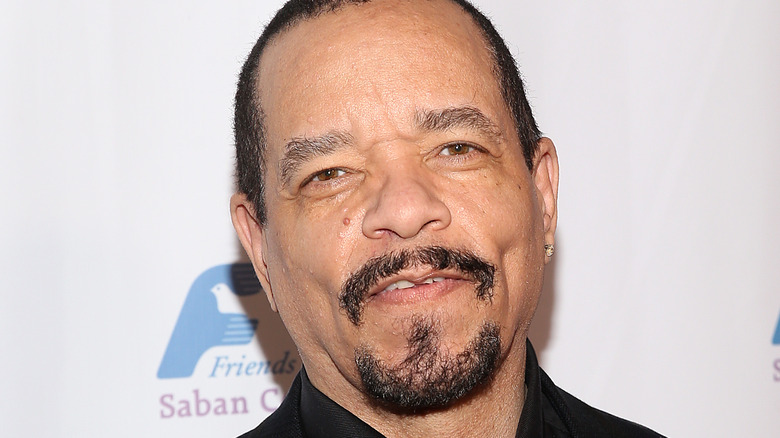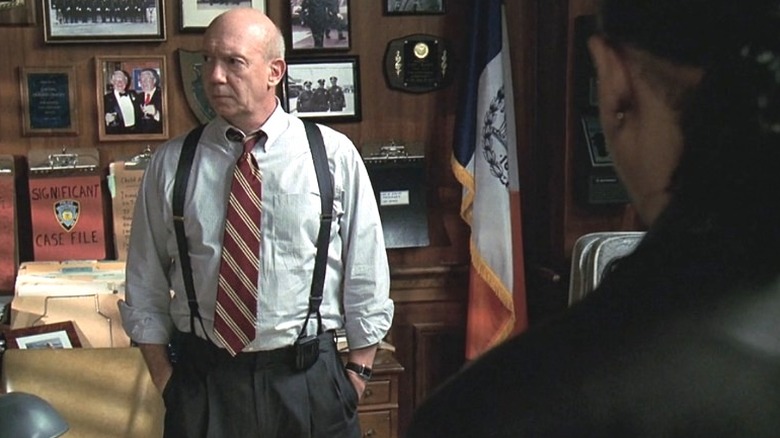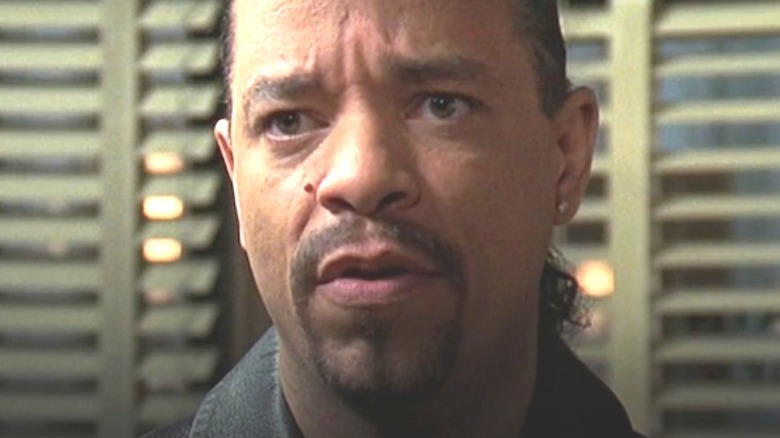The Best Fin Tutuola Quote From Law & Order: SVU Season 3
With the possible exception of Jerry Orbach's Lennie Briscoe, Ice-T's Detective Fin Tutuola might be the "Law & Order" franchise character best known for dropping notoriously quotable one-liners. So much so, in fact, that Fin's penchant for providing everything from mic drops to insults to truly confounding nonsequiturs has prompted fans to create their own memes of the character delivering absurd bits of explanatory dialogue. The memes, when imagined in the actor's voice, are occasionally difficult to distinguish from actual "Law & Order: Special Victims Unit" dialogue. Though Seasons 1 and 2 used Fin predominantly for the comedic relief provided by his playfully antagonistic relationship with Richard Belzer's Detective John Munch, in Season 3, the series begins to flesh out the character.
It's the first season, for instance, wherein the series paired the character up with Mariska Hargitay's Olivia Benson on a case, the first that gave us some tangible insight into his childhood, the first to mention Fin's son Ken (Ernest Waddell), and the first that illustrated his ability to bond with and relate to a victim, as he did with Martha Plimpton's Claire Rinato in "Denial." While it remains tempting, even after 23 seasons, to highlight some of the character's more comedic moments (as John Mulaney famously does in his SVU bit), Fin Tutuola's best line from Season 3 fell into a different category altogether.
Fin puts Cragan in his place in Rooftop
In Season 3, Episode 4 ("Rooftop"), Christopher Meloni's Detective Elliot Stabler spent the majority of the episode chasing the wrong suspect in a series of sexual assaults on young Black women. By the time he and Fin finally end up on the right track, members of the community were already frustrated by the NYPD's inability to locate and arrest a suspect. When the brother of one of the victims accuses the detectives of dragging their feet since his sister wasn't a rich white girl, Fin loudly indicts the media, who seem wholly uninterested in devoting any resources whatsoever to the story.
Fin's public assault on the press found its way back to 1PP, prompting Captain Cragan (Dann Floreck) to reprimand the detective. Though Fin's entire interaction with Cragan was one for the "SVU" books, there's one line in particular that stands as one of the character's most formative.
When Fin addressed the inequity in resources (and coverage, via The New Yorker) committed to solving crimes against white victims vs women of color from economically depressed neighborhoods, Cragan insisted he knows "where [Fin is] coming from" before pivoting to defend the NYPD. Understandably, Fin isn't having any of it. "No you don't know where I'm coming from," he said, adding, "there's no way you could know where I'm coming from." Cragan becomes immediately angry and defensive, at which point Ice-T's character both shut him down and delivered his best line of the season, saying: "No matter what you say, Captain, you're not Black and you're not from the hood."
Fin's reminder to Cragan serves both the series and the characters
That the line is as relevant in 2022 as it was when it first aired in 1998 all but goes without saying. But it's what the statement (finally) does for both the series and the characters involved that earns it such lasting cache.
In a 2020 article for Rolling Stone, EJ Dickson addressed what she calls "a necessary conversation about the lionization of cops in popular culture, and how such tropes condition us to view police officers." Though "SVU" would attempt to grapple with this discourse in its 2021 and 2022 seasons, in 1998, it had yet to paint its hero squad leader as anything but saintly. Though Cragan is investigated in Season 1, Episode 22 of "Law & Order," he's ultimately vindicated and proven wholly innocent. For years, it was only the most overtly corrupt cops (or "bad apples") that the franchise chose to indict.
Fin calling out Cragan's unawareness of his own limitations is the first time "SVU" attempts to grapple with implicit, as opposed to explicit, bias (a distinction outlined at length in a 2019 issue of the Annual Review of Law and Social Science), and acknowledge the lesser-addressed insidiousness of the former. Not only does it pull Cragan into the real world, but it's also the first time viewers are confronted with the struggle Fin faces as the squad's (at that time) only detective of color — a prescient moment for both the characters and the series as a whole.


